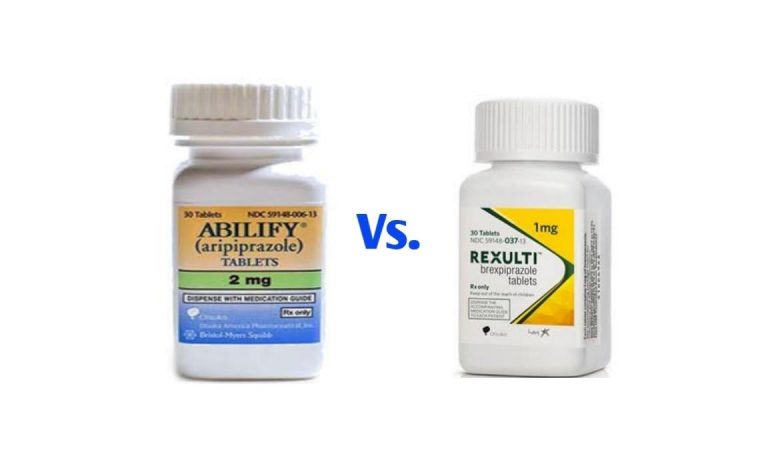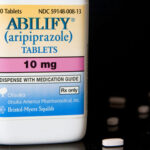Aripiprazole (Abilify) Vs. (Brexpiprazole (Rexulti): Differences, Similarities

What are antipsychotics?
Psychosis is a medical term. If you live with psychosis, you might see or hear things that aren’t there. This is known as hallucination. Or you might have firm beliefs that don’t match up to the way others see the world. This is known as delusion. During a psychotic episode, the person may experience delusions, hallucinations, or thought disturbances. Antipsychotic medications work to minimize or stop these symptoms.
There are many different types of antipsychotic medications. These works in different ways. People who begin taking antipsychotic medications are usually closely monitored by their doctor for the first few weeks. The doctor will be checking for signs of improvement as well as side effects.
There are two types of antipsychotic medications:
- typical, ‘first-generation’ (older) antipsychotics – these medications have been used since the 1950s
- atypical, ‘second-generation (newer) antipsychotics – these medications have been used since the 1990s.
While both generations are effective, the newer medications, in general, have several advantages over the older ones
A person usually begins to feel some improvement within six weeks of starting to take antipsychotic medication. However, it can take several months before they feel the full benefits. It is not possible to predict which medication will work best for a specific person. You might need to try a few before you find the right one for you.
Aripiprazole (Abilify) and (Brexpiprazole (Rexulti)
Abilify (aripiprazole) is an antipsychotic medication that works in the brain to treat schizophrenia. It is also known as a second-generation antipsychotic (SGA) or atypical antipsychotic. Aripiprazole (Abilify) rebalances dopamine and serotonin to improve thinking, mood, and behavior.
Brexpiprazole, sold under the brand name Brexpiprazole (Rexulti) is also an atypical antipsychotic. It is a dopamine D₂ receptor partial agonist and has been described as a “serotonin–dopamine activity modulator.
Second-generation antipsychotics, like Aripiprazole (Abilify) and Brexpiprazole (Rexulti), are newer and have fewer extrapyramidal side effects. Because they are better tolerated, they are the preferred treatment over the first-generation antipsychotics.
According to Singlecare.com, both drugs are approved by the United States Food and Drug Administration (FDA). Aripiprazole (Abilify) is also available in its generic form of aripiprazole. Brexpiprazole (Rexulti) is not currently available in generic form.
What are the main differences between Aripiprazole (Abilify) and Brexpiprazole (Rexulti)?
Dosage forms: Aripiprazole (Abilify) comes as a tablet, disintegrating tablets, oral solution, injection, long-acting injection depot while Brexpiprazole (Rexulti) comes only as a tablet.
Users: Aripiprazole (Abilify) can be used by adults and children (age at which Abilify can be used depends on condition) on the other hand Brexpiprazole (Rexulti) is only used by Adults.
Side Effects: The most common side effects of Aripiprazole (Abilify) in adults are nausea, vomiting, constipation, headache, dizziness, anxiety, insomnia, akathisia (a movement disorder due to antipsychotic medications), and agitation. Other side effects include indigestion, dry mouth, toothache, stomach discomfort, fatigue, stiffness, sedation, tremor, and cough. The most common side effects of Brexpiprazole (Rexulti) listed in the prescribing information are headache, dizziness, anxiety, akathisia, weight gain, fatigue, and agitation/restlessness.
Aripiprazole (Abilify) Vs. Brexpiprazole (Rexulti) which is better?
There is little data comparing the two drugs. To be FDA-approved, both drugs have undergone clinical trials for efficacy and safety. There is very little data comparing Aripiprazole (Abilify) Vs. Brexpiprazole (Rexulti) directly. An article in Therapeutic Advances in Psychopharmacology looked at data and reviewed studies (a meta-analysis). The researchers concluded that Rexulti caused fewer side effects of akathisia (movement disorder), insomnia, restlessness, nausea, weight gain, and sedation because of its activity at specific receptors.
The movement-related side effects of Abilify, though, seemed to be mild and managed by having the prescriber lower the dose. The high cost of brand-name Rexulti could also be a factor for many patients, compared to the lower price of generic Abilify. A small study compared Aripiprazole (Abilify) and (Brexpiprazole (Rexulti) in patients with acute schizophrenia (in a hospital setting) and found both drugs to be similarly effective. Patients taking (Brexpiprazole (Rexulti) experienced fewer extrapyramidal side effects. It is important to note the limitation that this study was an open-label study (where both the researchers and patients knew which drug the patient was taking). An open-label study is not as high-quality as a double-blind study where there is no bias.
One study looked at the side effect of weight gain from Aripiprazole (Abilify) and (Brexpiprazole (Rexulti). The study concluded that both drugs had a similar effect on body weight (an increase of about 5-10 lbs) after one year.
The most effective medicine is the one that works better for you and has the least (or most tolerable) side effects. Your healthcare provider can help you decide if Aripiprazole (Abilify) and (Brexpiprazole (Rexulti) is better for you, taking into account your medical conditions and history as well as other medications you take that could interact with Aripiprazole (Abilify) and (Brexpiprazole (Rexulti).
Can I use Aripiprazole (Abilify) and (Brexpiprazole (Rexulti) while pregnant?
Neonates exposed to atypical antipsychotics during the third trimester of pregnancy are at increased risk for extrapyramidal symptoms (some requiring extended hospitalizations) and withdrawal symptoms after delivery. There are risks with using the medications in pregnancy, and there are risks to not treating mental health conditions as well. Consult your healthcare provider for medical advice. If you are already taking Aripiprazole (Abilify) and (Brexpiprazole (Rexulti) and find out that you are pregnant, contact your healthcare provider.
The National Pregnancy Registry for Psychiatric Medications monitors pregnancy outcomes in patients who take psychiatric medicines while pregnant.
Can I use Abilify or Rexulti with alcohol?
No. You should not drink alcohol if you take Aripiprazole (Abilify) and (Brexpiprazole (Rexulti). The combination can increase the risk of CNS depression (excess sedation, psychomotor impairment, which could lead to accidents) and respiratory depression (breathing slows or can even stop), and low blood pressure.
Does Rexulti increase dopamine?
Atypical antipsychotics like Rexulti (and Abilify) have partial agonist activity on the D2 dopamine receptors. A partial agonist means that the drug binds to the receptor and activates it, but it is only partially effective (compared to a full agonist). So, these drugs partially activate dopamine receptors, which increase dopamine levels. These drugs also work on serotonin receptors.





